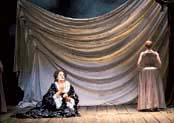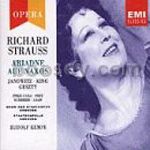OPERA SEARCH

Ariadne auf Naxos (1916 version)
(1916)Libretto by Hugo von Hofmannsthal (G,Cz,E,F,I)
Main roles: colS,dramS
Subsidiary roles: M,5T,4Bar,B,actor (Prologue)
2S,M,3T,Bar,B (Opera)
2.2.2(II=bcl).2-2.1.1.0-timp.perc:glsp/tamb/tgl/cyms/SD-pft-harm-cel-2harp-strings(6.0.4.4.2)
Abbreviations (PDF)
Boosey & Hawkes
Hofoper, Vienna
Conductor: Franz Schalk
Company: Vienna Hofoper
| Characters in the Prologue: | |
| THE MAJOR-DOMO | Spoken role |
| MUSIC MASTER | Baritone |
| THE COMPOSER | Soprano |
| THE TENOR (later Bacchus) | Tenor |
| AN OFFICER | Tenor |
| THE DANCING MASTER | Tenor |
| THE WIG-MAKER | Bass |
| A LACKEY | Bass |
| ZERBINETTA | Soprano |
| PRIMA DONNA (later Ariadne) | Soprano |
| HARLEQUIN | Baritone |
| SCARAMUCCIO | Tenor |
| TRUFFALDINO | Bass |
| BRIGHELLA | Tenor |
| Characters in the opera: | |
| ARIADNE | Soprano |
| BACCHUS | Tenor |
| NAIAD, a nymph | Soprano |
| DRYAD, a nymph | Contralto |
| ECHO, a nymph | Soprano |
Vienna in the early 18th century
The Prologue
The richest man in Vienna has ordered a post-dinner entertainment for his guests. The Music Master complains that the new opera Ariadne auf Naxos is is to be followed by an Italian comedy, Zerbinetta and her Four Lovers. The Major Domo replies that his master has paid for what he wants. The young composer arrives, along with the two performing companies, and is made to feel distinctly unwanted. He is shocked to discover that Zerbinetta and the comedians are to perform after the premiere of his serious opera, and the Prima Donna objects to the rival female attraction. The Major Domo announces dinner has ended and that both opera and comedy must be played simultaneously so the fireworks can begin at 9 pm. The opera artists are horrified, but the comedians are happy to employ their improvisational skills. Zerbinetta is told the opera's plot and devises a synopsis for the combined entertainment. She charms the composer, he passionately agrees on the compromise, and the performance begins.
The Opera
Three nymphs sing of the sadness of Ariadne, abandoned by Theseus. Ariadne bemoans her fate and Zerbinetta, with the comedians in the wings, suggests Harlequin sings a cheerful song. Taking no notice Ariadne calls for Hermes, the messenger of death. The male comedians attempt to divert her, but Zerbinetta sends them off-stage and confides with Ariadne about the plight of all women at the hands of faithless men, while declaring women should be just as fickle in love. Ariadne retreats into her cave and the comedians' entertainment takes place with Harlequin winning Zerbinetta's affections. The three nymphs herald the arrival of Bacchus, who has escaped the lures of the sorceress Circe. Ariadne believes him to be Hermes and offers herself up to him. Zerbinetta, in the wings, repeats her prediction: 'a new god approaches and we surrender without a word', while Ariadne and Bacchus declare undying love.
The tangled progress of Strauss and Hofmannsthal's engagement with Molière's Le Bourgeois gentilhomme resulted in four independent yet interrelated works, all assigned op.60 in his worklist:
Ariadne auf Naxos (1912 version).
Following the success of Der Rosenkavalier in 1911 Strauss and Hofmannsthal planned a further work set in the baroque period, again centred on the topical theme of the social rise of the emerging nouveau riche. Hofmannsthal homed in on Molière's play Le Bourgeois gentilhomme and Strauss was attracted to the idea of reworking the original musical material by Lully. Hofmannsthal reduced Molière's play from five acts to two, providing Strauss with opportunties for incidental music, particularly the witty dinner scene with its use of musical quotation linked to each course of food. The play was followed by a new and, for its time, radical through-composed entertainment, colliding opera seria with commedia dell'arte as an alternative to the Turkish theatricals of the original play. The original Ariadne auf Naxos had un unfortunately protracted first performance and a mixed reception thereafter, neither satisfying theatre nor opera audiences. It became increasingly clear that, outside festival conditions, the expense of hiring a theatre company and an opera company was an impractical barrier to frequent future performances.Ariadne auf Naxos (1916 version).
In 1916 Strauss and Hofmannsthal agreed to go forward with a new version. This replaced the Molière play with a new through-composed prologue, elaborating the short text in which the decision to play the opera and comedy simultaneously is revealed. The roles from the original opera were expanded into the new prologue, as was that of the composer who appeared briefly as a spoken role in the original play. Monsieur Jourdain does not appear, and a Major Domo functions as his mouthpiece. The action is transferred from Paris to Vienna, and the Prologue takes place backstage. Strauss made numerous changes in the revised opera, including limiting the difficulty, range and length of Zerbinetta's aria Grossmächtige Prinzessin, removing her preparation of Ariadne before the arrival of Bacchus, and keeping the comedians off the stage at the close other than an aside from Zerbinetta, so as to focus on the love music of Ariadne and Bacchus. The practicality and conventional operatic nature of the 1916 version meant that, perhaps unfairly, it soon superceded the 1912 version. This later version remains the one that is regularly performed today.Der Bürger als Edelmann (1917)
Hofmannsthal felt the 1916 version was too far away from his original Moliere-inspired intententions and he rightly regarded Strauss's incidental music as well worth rescuing from oblivion. In 1917 he persuaded Strauss to collaborate on turning their attention to reworking the 1912 play into a musical comedy. The drama was refashioned into three acts, removing all references to the opera and commedia dell'arte characters and reintroducing a Turkish ceremony in the final act. The incidental music from the 1912 play was retained and Strauss wrote some additional material, particularly for Act III with its opportunities for sung items and chorus. This version was not a success at its 1918 premiere, but Strauss retained an affection for the music throughout his life, choosing it as the culiminatory work at his 85th birthday celebrations in 1949.Le Bourgeois genthilhomme Suite (1920)
Hofmannsthal proposed that the 1917 version be turned into a new opera, but Strauss refused. Instead he extracted musical items to create the much-loved 25-minute orchestral suite which was premiered with great success in Vienna in January 1920. It remains a pioneering example of neoclassicism and rapidly became a popular score for ballet usage including a celebrated production by the Ballet Russes de Monte Carlo in 1944.
Comic, Romantic

Elisabeth Schwarzkopf/Irmgard Seefried/Rita Streich/Rudolf Schock/Karl Dönch/Hermann Prey/Hugues Cuénod/Philharmonia Orchestra/Herbert von Karajan
EMI CMS5670772
Click here to purchase this CD set from Amazon
Gundula Janowitz/Teresa Zylis-Gara/Sylvia Geszty/James King/Theo Adam/Hermann Prey/Siegfried Vogel/Peter Schreier/Staatskapelle Dresden/Rudolf Kempe
EMI CMS7641592
Click here to purchase this CD set from Amazon
